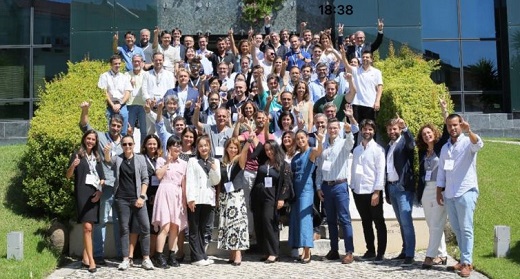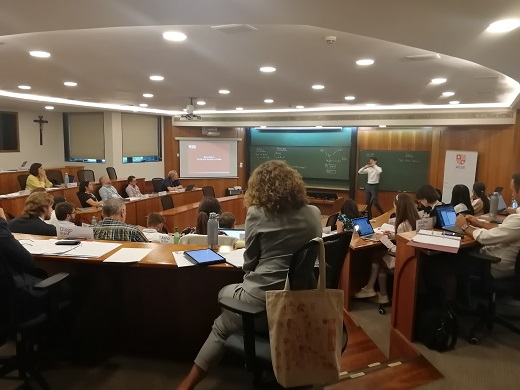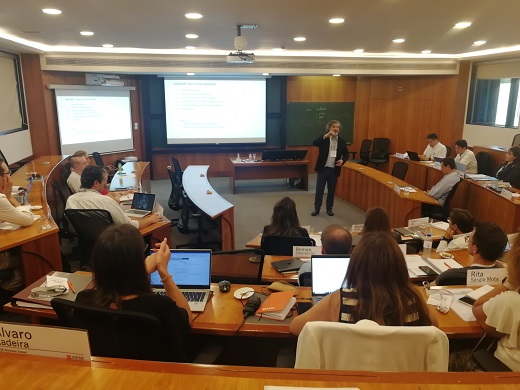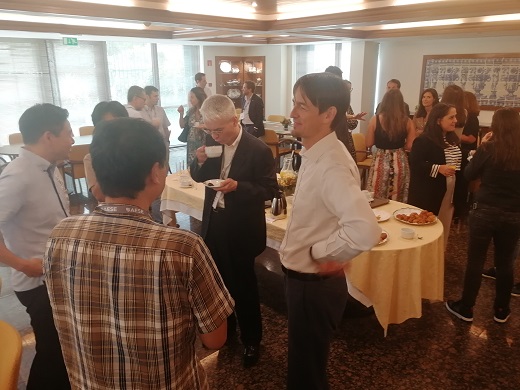【Meiji MBA】Report of International Week in Lisbon
Oct. 06, 2023




Meiji University Business School (Graduate School of Global Business, MBS) held the "International Week in Lisbon" (facilitated by Prof. Fujio Yamaguchi) in collaboration with AESE Business School in Portugal. The International Week is part of the Global Business Studies course at MBS, which is designed to cultivate an international mindset among students.
In 2018, MBS obtained the international accreditation named EPAS (now EFMD Accredited), which led to the conclusion of a memorandum of understanding with AESE Business School, Portugal's prestigious business school, in July 2020, to implement a mutual student exchange programme (International Week). In FY2021, the program was under the Covid-19 pandemic, but eight MBS students participated online; in FY2022, nine MBS students were sent to AESE Business School in Portugal in September, and 27 students from AESE Business School were sent to Meiji University from October to November. In FY2023, five students participated in the International Week in New York at IESE Business School New York, a sister school of AESE Business School in New York.
<International Week in Lisbon at AESE Business School, Portugal>
Wednesday 6 - Saturday 9 September 2023
This time, a formation ceremony was held online on 5 August, and students who participated in last year's International Week in Lisbon (hereafter referred to as IW) were invited to attend to report on how it was conducted last year and what they should study beforehand, followed by a question-and-answer session. The course is basically conducted using the case method by three professors from IESE Business School in Spain, a partner business school of AESE Business School. The case method is a teaching method that simulates the experience of corporate management through discussions among students about management-level issues that have arisen in actual companies, and how to make decisions and solve specific problems. Last year, we conducted preliminary case method studies, but as the method varies greatly from professor to professor, we changed to a method in which we listen to our seniors and then conduct preliminary studies on our own. As a result, the students organised several preliminary study sessions, concluding that it is important to read the main case carefully and completely, to think about the important points and problems and how to solve them from their own perspective, and also to organise independent study groups to discuss the material.
From 6 September, eight students from MBS were sent to AESE Business School in Lisbon, Portugal, for active discussions through the school's Excelling in Leadership Executive MBA Intensive Week Programme. The participants included 15 students from Danube University in Austria, 8 students from Krakow Business School in Poland and 41 students from AESE Business School, making a total of 72. The diversity of the participants from MBS, including international students, was welcomed by AESE with great enthusiasm. The 72 participants were divided into two groups of 36 students each, Groups 1 and 2, and each group of 36 students received a case study. Each group was further divided into four teams, making a total of eight teams for the Japanese participants.
[DAY 1]
The AESE Business School building has a four-storey atrium, with the canteen at the back of the ground floor. The IW begins with a sumptuous Portuguese-style lunch. The semi-circular auditorium on the ground floor of the semi-circular Zero floor is where the AESE Business School Dean's address was given, followed by the addresses of the programme faculty members from the participating business schools. During the Meiji greeting, all students stood up as the eight samurais who participated from MBS in the greeting by the faculty members in charge of the program and each one of them gave a speech. Groups 1 and 2 have the same content, so here we describe specifically what Group 2 did.
From 15:00 to 19:30, Professor Sebastian Reiche, also a professor at IESE Business School, taught the students about leadership in a multicultural environment in global companies. Using the case of a Korean company, he explained that internationalisation creates a multicultural environment in a company, which raises problems in managing people within the organisation that were not there before. The case provided a case-based discussion on how to effectively manage the international division of labour in such situations.
At this IW, there is always a half-hour coffee break in the morning and afternoon, when all students with their teachers meet in the ground floor canteen for a chat. Several kinds of delicious cakes and sometimes sandwiches are served, and the conversation is lively.
[DAY 2]
The morning of Day 2 continues the previous day with a study of global leadership by Professor Sebastian Reiche. The case study of Haier in the Japanese market was chosen, and students from Japan and China played an active role, partly because it was a Japanese case study and partly because they were used to English. In the afternoon, students learnt about Design Thinking (DT) by Prof Joaquim Vilà: how DT is based on ideas, based on a project carried out at IDEO, a company of excellence in the application of DT. The lecture ended at 17:00.
[DAY3]
In the morning, the participants continued their learning of DT from the previous day, which was fully discussed using SAP cases. In the afternoon, the participants further learnt that DT is essential in corporate strategy and that the fate of a company depends on the concept of DT in top management, which was further discussed through various cases. The participants learned about global trends from the perspectives of macroeconomics and socio-economic history. First, the students learnt about trends in the global economy, using a wealth of statistics and graphs spanning more than 70 years. Various statistics on climate change issues and changes in supply chains due to the recent war in Ukraine were also discussed.After the 5pm lecture, a dinner party was held to get to know each other better.
[DAY4]
Continuing from the previous day, Prof. Pedro Videla gave a study on global trends. The roles of business strategists, organisational leaders, CEOs and governments were discussed in the context of the global trends learnt on the previous day. The current business environment was constantly being challenged by new challenges, such as the globalisation of business, the emergence of new business models that disrupt existing business practices, pandemics, natural disasters caused by climate change, the war in Ukraine and the conflict between China and the USA. The companies debated how they should address the challenge of creating economic value in an environmentally sustainable and socially responsible manner.
The event concluded with a speech by AESE's programme director, who presented the participants with a certificate of completion. The content of this year's IW in Lisbon lectures was very well documented, as the professors were the same as last year, but various statistics and pandemic case studies were added or revised. We then considered how to secure global leadership and achieve prosperity and peace in the world using the method of design thinking, while addressing geopolitical risks and climate change issues from the perspective of global historical world trends. This year's conference had the aspect of a world conference with 80 participants, including teachers, from Portugal, Austria, Germany, Poland, Romania, Ukraine, South Africa, China, Japan, South Korea and Taiwan, from different regions of the world, who discussed and debated the issues. It was a very useful and valuable experience. The conference closed with a promise to meet again at IW in Meiji at Meiji University next February.
In 2018, MBS obtained the international accreditation named EPAS (now EFMD Accredited), which led to the conclusion of a memorandum of understanding with AESE Business School, Portugal's prestigious business school, in July 2020, to implement a mutual student exchange programme (International Week). In FY2021, the program was under the Covid-19 pandemic, but eight MBS students participated online; in FY2022, nine MBS students were sent to AESE Business School in Portugal in September, and 27 students from AESE Business School were sent to Meiji University from October to November. In FY2023, five students participated in the International Week in New York at IESE Business School New York, a sister school of AESE Business School in New York.
<International Week in Lisbon at AESE Business School, Portugal>
Wednesday 6 - Saturday 9 September 2023
This time, a formation ceremony was held online on 5 August, and students who participated in last year's International Week in Lisbon (hereafter referred to as IW) were invited to attend to report on how it was conducted last year and what they should study beforehand, followed by a question-and-answer session. The course is basically conducted using the case method by three professors from IESE Business School in Spain, a partner business school of AESE Business School. The case method is a teaching method that simulates the experience of corporate management through discussions among students about management-level issues that have arisen in actual companies, and how to make decisions and solve specific problems. Last year, we conducted preliminary case method studies, but as the method varies greatly from professor to professor, we changed to a method in which we listen to our seniors and then conduct preliminary studies on our own. As a result, the students organised several preliminary study sessions, concluding that it is important to read the main case carefully and completely, to think about the important points and problems and how to solve them from their own perspective, and also to organise independent study groups to discuss the material.
From 6 September, eight students from MBS were sent to AESE Business School in Lisbon, Portugal, for active discussions through the school's Excelling in Leadership Executive MBA Intensive Week Programme. The participants included 15 students from Danube University in Austria, 8 students from Krakow Business School in Poland and 41 students from AESE Business School, making a total of 72. The diversity of the participants from MBS, including international students, was welcomed by AESE with great enthusiasm. The 72 participants were divided into two groups of 36 students each, Groups 1 and 2, and each group of 36 students received a case study. Each group was further divided into four teams, making a total of eight teams for the Japanese participants.
[DAY 1]
The AESE Business School building has a four-storey atrium, with the canteen at the back of the ground floor. The IW begins with a sumptuous Portuguese-style lunch. The semi-circular auditorium on the ground floor of the semi-circular Zero floor is where the AESE Business School Dean's address was given, followed by the addresses of the programme faculty members from the participating business schools. During the Meiji greeting, all students stood up as the eight samurais who participated from MBS in the greeting by the faculty members in charge of the program and each one of them gave a speech. Groups 1 and 2 have the same content, so here we describe specifically what Group 2 did.
From 15:00 to 19:30, Professor Sebastian Reiche, also a professor at IESE Business School, taught the students about leadership in a multicultural environment in global companies. Using the case of a Korean company, he explained that internationalisation creates a multicultural environment in a company, which raises problems in managing people within the organisation that were not there before. The case provided a case-based discussion on how to effectively manage the international division of labour in such situations.
At this IW, there is always a half-hour coffee break in the morning and afternoon, when all students with their teachers meet in the ground floor canteen for a chat. Several kinds of delicious cakes and sometimes sandwiches are served, and the conversation is lively.
[DAY 2]
The morning of Day 2 continues the previous day with a study of global leadership by Professor Sebastian Reiche. The case study of Haier in the Japanese market was chosen, and students from Japan and China played an active role, partly because it was a Japanese case study and partly because they were used to English. In the afternoon, students learnt about Design Thinking (DT) by Prof Joaquim Vilà: how DT is based on ideas, based on a project carried out at IDEO, a company of excellence in the application of DT. The lecture ended at 17:00.
[DAY3]
In the morning, the participants continued their learning of DT from the previous day, which was fully discussed using SAP cases. In the afternoon, the participants further learnt that DT is essential in corporate strategy and that the fate of a company depends on the concept of DT in top management, which was further discussed through various cases. The participants learned about global trends from the perspectives of macroeconomics and socio-economic history. First, the students learnt about trends in the global economy, using a wealth of statistics and graphs spanning more than 70 years. Various statistics on climate change issues and changes in supply chains due to the recent war in Ukraine were also discussed.After the 5pm lecture, a dinner party was held to get to know each other better.
[DAY4]
Continuing from the previous day, Prof. Pedro Videla gave a study on global trends. The roles of business strategists, organisational leaders, CEOs and governments were discussed in the context of the global trends learnt on the previous day. The current business environment was constantly being challenged by new challenges, such as the globalisation of business, the emergence of new business models that disrupt existing business practices, pandemics, natural disasters caused by climate change, the war in Ukraine and the conflict between China and the USA. The companies debated how they should address the challenge of creating economic value in an environmentally sustainable and socially responsible manner.
The event concluded with a speech by AESE's programme director, who presented the participants with a certificate of completion. The content of this year's IW in Lisbon lectures was very well documented, as the professors were the same as last year, but various statistics and pandemic case studies were added or revised. We then considered how to secure global leadership and achieve prosperity and peace in the world using the method of design thinking, while addressing geopolitical risks and climate change issues from the perspective of global historical world trends. This year's conference had the aspect of a world conference with 80 participants, including teachers, from Portugal, Austria, Germany, Poland, Romania, Ukraine, South Africa, China, Japan, South Korea and Taiwan, from different regions of the world, who discussed and debated the issues. It was a very useful and valuable experience. The conference closed with a promise to meet again at IW in Meiji at Meiji University next February.
Contact us
Meiji Business School Office
E-mail
guroken◆mics.meiji.ac.jp *Replace ◆with @ to email to us
URL
https://www.meiji.ac.jp/cip/english/graduate/global/index.html
guroken◆mics.meiji.ac.jp *Replace ◆with @ to email to us
URL
https://www.meiji.ac.jp/cip/english/graduate/global/index.html


